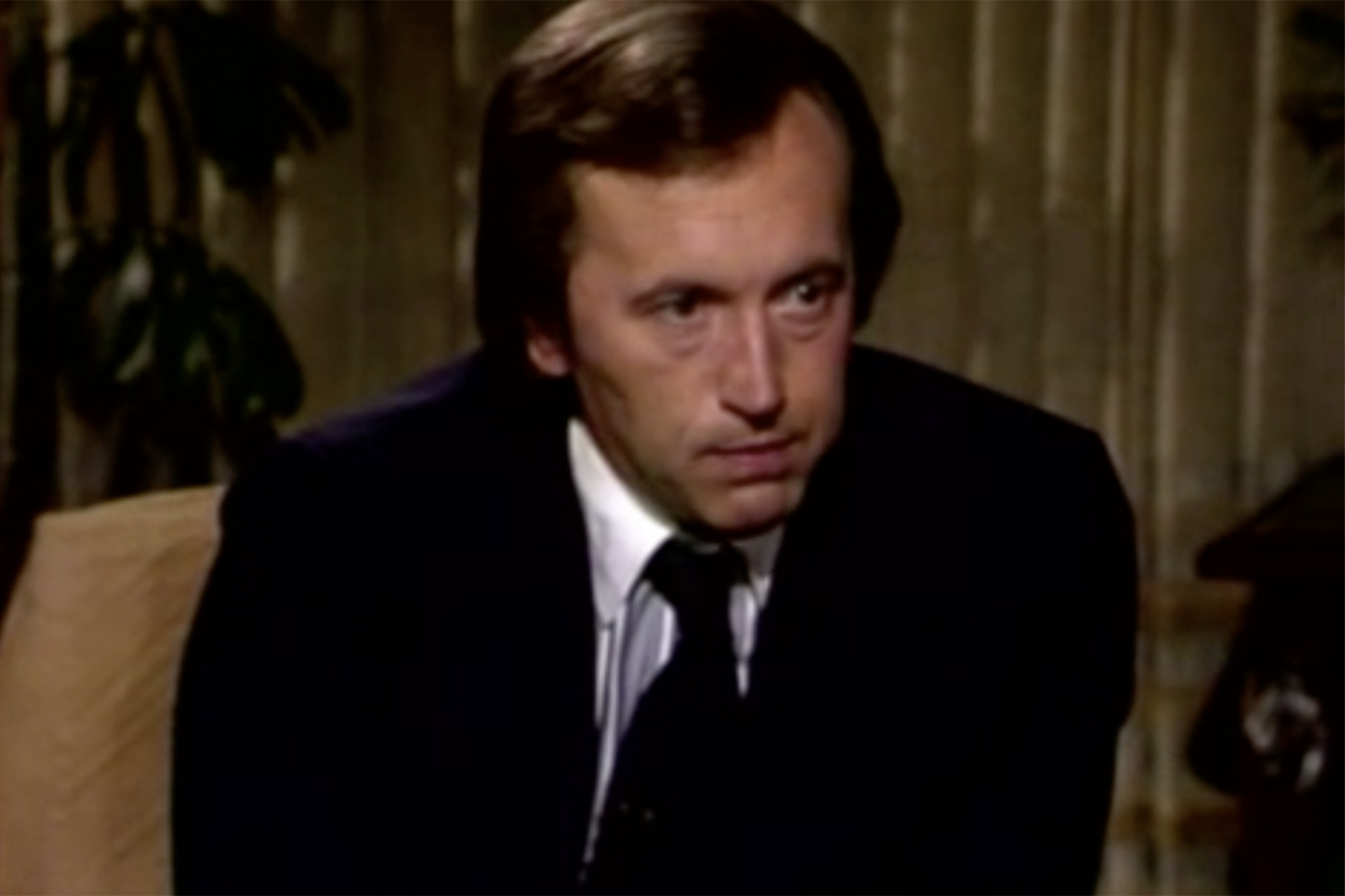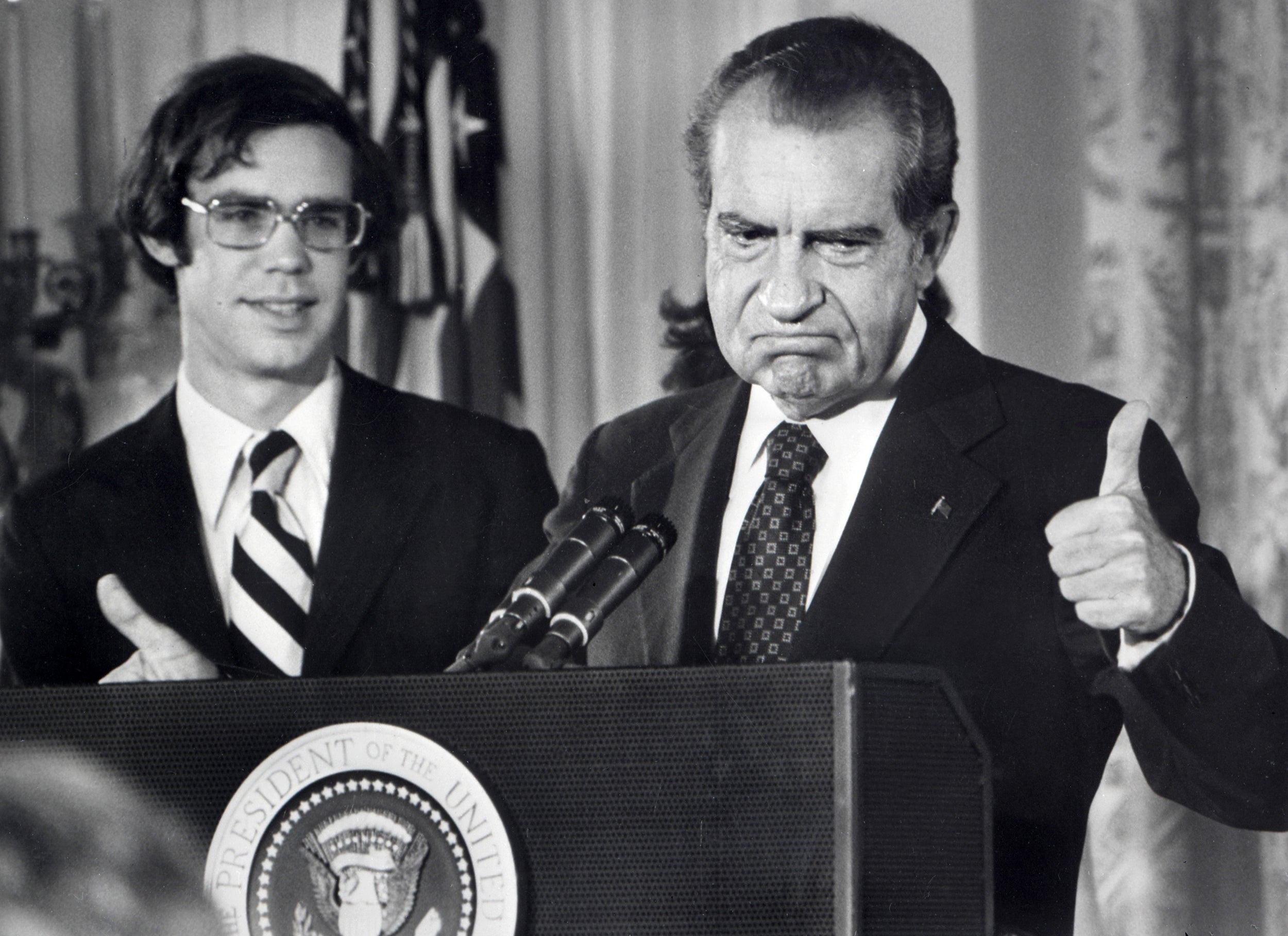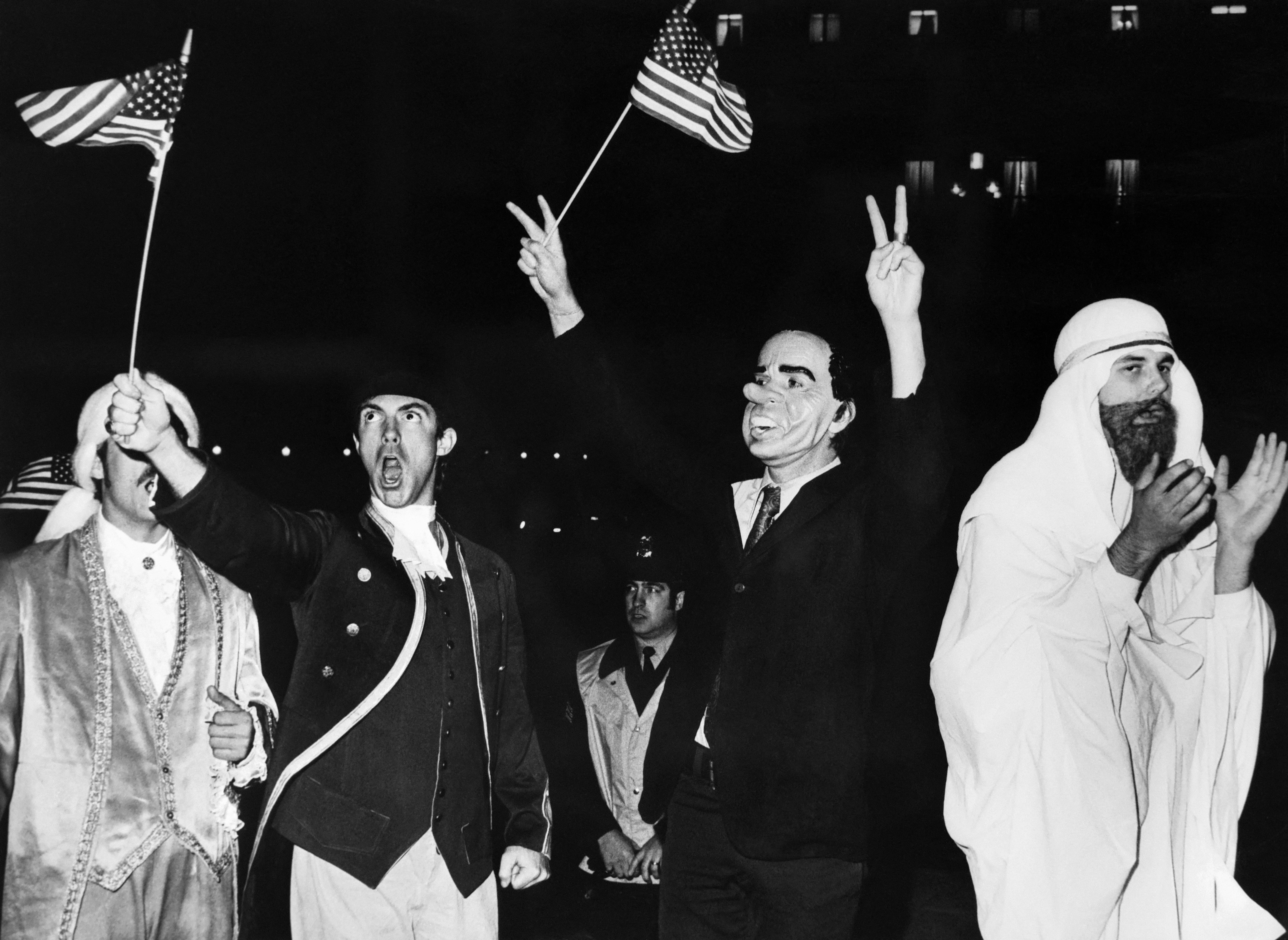Wilf Frost: Dad’s famous interview with disgraced Richard Nixon shows how dangerous Trump is today
For a nation reeling from Watergate, the infamous David Frost interview is remembered for the sweat on Nixon’s top lip and the devastating pauses. As is is broadcast again, it also serve as a prophecy for the second coming of a president who believes he’s above the law, writes Guy Walters
In the spring of 1977, Richard Nixon leaned back in a comfortable armchair in a seaside house in Orange County in California and uttered 13 words that would define his post-Watergate legacy: “Well, when the president does it … that means that it is not illegal.” Delivered with a matter-of-fact defiance of a man still convinced of his own righteousness, Nixon’s statement crystallised the pathology of unchecked power.
The person to whom he made that extraordinary statement was, of course, David Frost, who interviewed Nixon for some 28 hours over March and April of that year. The full story behind that encounter is now being shown on Sky as part of a series called David Frost vs..., which is partly produced by Frost’s son, Wilfred, who is a presenter for the channel.
Nearly half a century later, those same words hang like a warning over American democracy. In the age of Donald Trump – a man who has not only embraced Nixon’s imperial posture but has surpassed it in bravado and disregard for democratic norms – the Frost/Nixon interviews feel less like historical artefact and more like prophecy.

The interviews, famously bought for $600,000 by Frost’s production team after US networks turned them down, were dismissed by many as a folly. It was widely felt that Frost lacked the gravitas or journalistic rigour to interrogate the disgraced president meaningfully. Yet what unfolded across four weeks of interviews stunned the public.
“You’ve got to remember that my father really gambled everything on this,” says Wilfred Frost. “He basically mortgaged his life to do the interviews. And while most people think my father got to the interviews out of nowhere, people forget that he had been working on Nixon for a long time – he had interviewed him when he was a candidate in 1968, and he had even hosted the White House Christmas party for Nixon.”
Frost’s genius lay in allowing the former president to talk – and to talk at length.
“Nixon’s answers will go on for something like 17 minutes,” says Frost. “But that’s not a mistake by my dad, but totally planned. It was a brilliant interviewing strategy, and it lulled Nixon. I’m convinced Nixon would never have said what he said to anybody else.”
What Frost extracted wasn’t a confession in the legal sense, nor was it a full-throated apology. But in a halting, rhetorical dance – and with his eyes clearly glistening – Nixon admitted that he had “let down the country”, “let down the system”, and most chillingly, expressed his belief that presidential power effectively superseded the law. It was a glimpse into a psychology in which power justifies itself.
It is a psychology that is all too present in the current occupant of the White House.
From the very beginning of Trump’s presidency, comparisons with Nixon abounded. He inherited not just the office, but also a siege mentality: a deep resentment of the press, a penchant for secrecy, and a loyalty-based governance style that blurred the line between public duty and personal interest.
But where Nixon whispered and schemed in secret, Trump shouts from social media. Nixon had tapes – Trump has tweets, rants and rallies. Nixon built his imperial presidency behind the scenes; Trump flaunts his, branding it with gold letters and cable-news theatrics.

Both men shared the belief that the presidency endowed them with a kind of moral immunity. But whereas Nixon’s transgressions led to disgrace and resignation, Trump’s presidency has defied political gravity. Two impeachments, a violent insurrection, and multiple criminal investigations have done little to damage his grip on his political base. He is, by all measures, the embodiment of Nixon’s dictum – and the proof that it has gone unchallenged.
The power of the Frost/Nixon interviews lies not just in what Nixon said, but in the fact that someone challenged him. For a nation reeling from Watergate, it was a catharsis. Frost’s polite persistence, disarming charm, and surgical questioning built a crescendo that cornered Nixon into reflection.
In one of the most riveting moments, Frost directly pressed him with the words: “So, what in a sense you’re saying is that there are certain situations … where the president can decide that it’s in the best interest of the nation or something and do something illegal.” Nixon paused, then responded with the infamous line. Frost’s expression – a flicker of disbelief – said what millions of Americans were thinking.
The interviews – later the basis for Peter Morgan’s play and Oscar-nominated film, starring Michael Sheen – were a public reckoning, not just for Nixon, but for the presidency itself. They asserted that even the highest office in the land must answer to the people.
No such reckoning has arrived for Trump. If anything, the institutions meant to contain the presidency – Congress, the Department of Justice, the Supreme Court – have been repeatedly tested, and often found wanting. The impeachment trials were more partisan theatre than a pursuit of truth. The public spectacle lacked a Frost and, more crucially, it lacked a Nixon willing to engage.

What the Frost/Nixon interviews offered in 1977 was a rare act of democratic accountability. Nixon’s admission, as limited and lawyerly as it was, at least acknowledged that something had gone wrong. It was an act of facing the music, however discordant.
Trump, by contrast, thrives in the noise. His approach to scandal is not denial but deflection and escalation. When accused, he accuses back. When investigated, he cries witch hunt. When caught, he doubles down. There is no moment of introspection – only perpetual combat.
In this environment, the very idea of a modern-day Frost/Nixon interview seems implausible. Who could match his command of the spectacle? Frost came armed with a stack of documents, months of preparation, and a quiet intellect. Trump would meet such an approach with memes, slogans, and the rolling thunder of a Maga rally.
“Modern-day events have made the interviews and the whole episode more relevant than you might think possible,” says Wilfred, who is possibly the only person on the planet who has watched all 28 hours of interviews not once, but twice. “And while a vast majority of it sounds like something that could be from the present occupant of the White House, the most important part of it – the critical point of the interviews in which Nixon acknowledges and apologises – is completely polar to how Trump would respond.”
The tragedy is not just that Nixon’s worldview lives on – it’s that we have failed to heed its warning. When Nixon said,demonstrated “When the president does it, that means it is not illegal,” the public recoiled. Today, a significant swath of Americans nod along.

The imperial presidency has metastasised. It is not merely a Nixonian or Trumpian affliction; it is systemic. With executive orders followed through without congressional approval, the presidency increasingly resembles a monarchy in all but name. We can no longer rely on shame or tradition to constrain power. We cannot count on a modern Nixon to yield, nor a modern Frost to extract an apology.
The Frost/Nixon interviews are often remembered for their drama – the sweat on Nixon’s top lip, the devastating pauses, the steely-eyed stare of Frost. But their true importance lies in the fact that they occurred at all. They were not a trial, but they were an inquest. They were not therapy, but they were a confrontation. And in that moment, power blinked. Nixon, cornered by calm reason, admitted the unthinkable.
That such a moment seems impossible today is not just a reflection of the men who hold office, but of the public that empowers them. We must remember what Frost forced Nixon to say, and more importantly, what Nixon believed. Because now, more than ever, we must answer a question that Nixon raised, intentionally or not: what happens to democracy when a president believes he is the law?
The Frost/Nixon interviews were supposed to be the final chapter of a dark period. Instead, they were the first warning.
The ‘David Frost vs...’ documentary series is on Sky Documentaries



Join our commenting forum
Join thought-provoking conversations, follow other Independent readers and see their replies
Comments